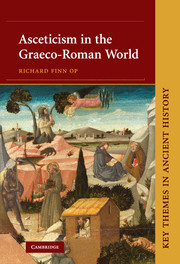Book contents
2 - Asceticism in Hellenistic and Rabbinic Judaism
Published online by Cambridge University Press: 22 January 2010
Summary
MOSES – THE ASCETIC PHILOSOPHER-KING
In his Life of Moses, the Alexandrian Jewish exegete Philo (c. 15 BC– AD 50) related, in the absence of any biblical account of Moses' upbringing, how the future leader of the Ancient Israelites had been educated within the Egyptian royal household. The boy rapidly outstripped his Egyptian and Greek tutors to master mathematics, geometry, music, the language of the Assyrians, and the Chaldaeans' knowledge of the heavens. It was, in other words, an education to rival that of any Pythagoras. To match the knowledge of the Greek sages was not merely a feather in Moses' cap. Nor was it simply an opportunity to claim the superiority of Judaism over the dominant Hellenistic culture. Such wisdom was, as Philo conceived it, essential to Moses' inspired leadership: the Israelite was envisaged as a type of philosopher-king, one who excelled in the moral and intellectual virtues required of a just lawgiver. It was the philosopher's contemplative intimacy with God which allowed him to enshrine faithfully the divine wisdom in the timeless legislation of the Jewish Law (the Torah).
Moses, the uncrowned philosopher-king, was thus portrayed in terms drawn from the Greek philosophical tradition. The rule of others presupposed self-control; moral excellence lay in a Platonic subjection of the passions to reason, so that the ‘violent affections’ of his soul were reined in like a ‘restive horse’, an allusion to the famous description of the virtuous soul in Plato's Phaedrus.
- Type
- Chapter
- Information
- Asceticism in the Graeco-Roman World , pp. 34 - 57Publisher: Cambridge University PressPrint publication year: 2009



